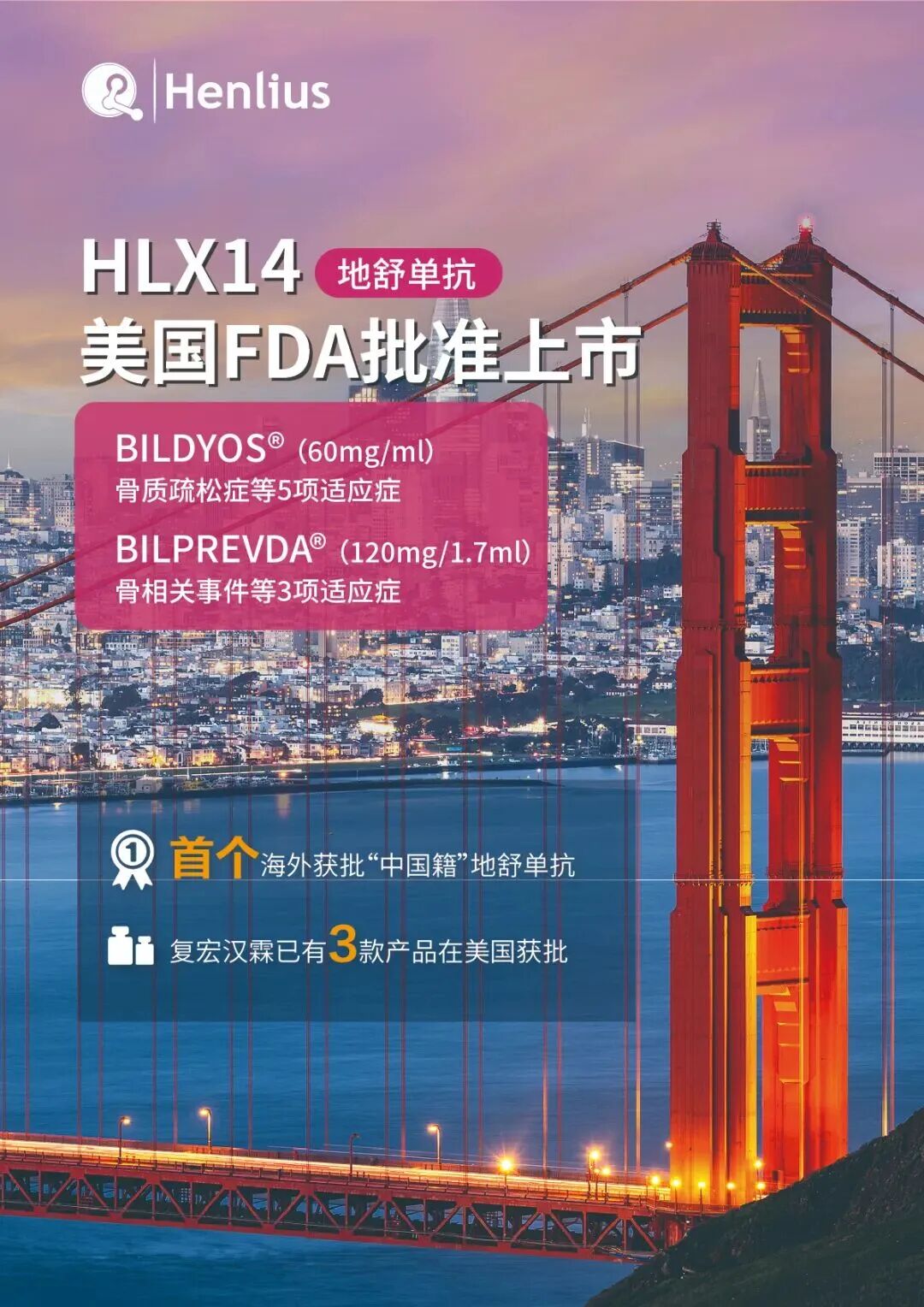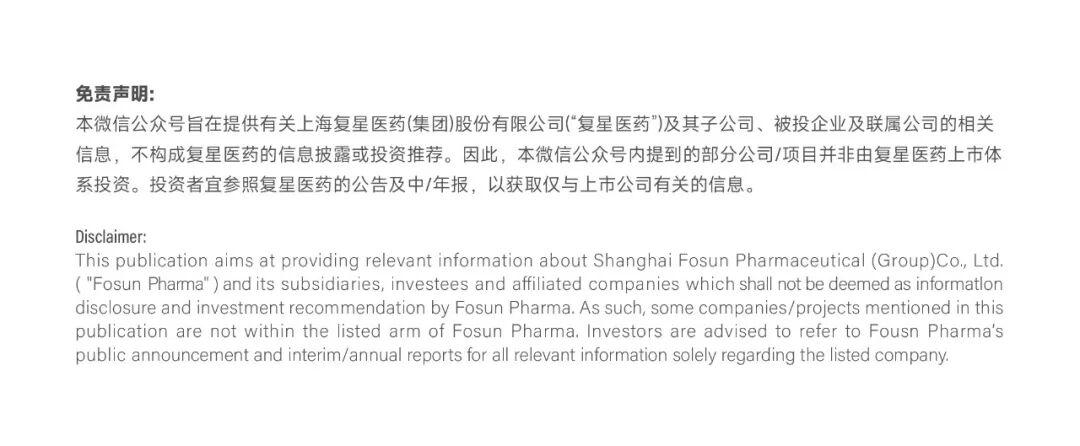国产首个!复星医药子公司复宏汉霖「地舒单抗」在美国获批上市

中国上海 & 美国新泽西州泽西市,2025年9月2日 —— 复宏汉霖(2696.HK)与Organon(纽交所代码:OGN)今日共同宣布,美国食品药品监督管理局(FDA)已批准地舒单抗注射液(60mg/mL)BILDYOS®(denosumab-nxxp)和地舒单抗注射液(120mg/1.7mL)BILPREVDA®(denosumab-nxxp)的上市申请。两款产品分别为PROLIA®(denosumab)和XGEVA®(denosumab)的生物类似药,此次获批覆盖原研产品在美国已获批的所有适应症1,2。

Organon生物类似药和普药业务美国商业主管 Jon Martin 表示:“BILDYOS和BILPREVDA 的FDA成功获批标志着我们朝提升关键骨骼护理治疗可及性迈出了重要一步。数百万美国人,都需要这些治疗,尤其是日益增长的老龄化人口3,4,5。我们开发这些生物类似药的目标是提高多个治疗领域的可及性和可负担性,包括对女性影响很大的骨质疏松症3,4。此次获批彰显了 Organon 坚定不移地致力于让患者获得优质且高品质、可负担的治疗,同时致力于为骨骼健康护理创造更可持续的未来4,5,6。”
使用 BILDYOS 治疗的晚期肾病患者存在更高的严重低钙血症风险。已有报告显示,地舒单抗类产品可导致严重低钙血症,并引发住院、危及生命的事件,甚至死亡病例。慢性肾脏病-矿物质与骨异常(CKD-MBD)的存在会显著增加低钙血症风险。在为晚期慢性肾病患者启动 BILDYOS 治疗之前,应评估其是否存在 CKD-MBD。这类患者的 BILDYOS 治疗应在具备 CKD-MBD 诊断和管理经验的医疗专业人员监督下进行。更多安全性信息见下文。
BILPREVDA 是一种 RANK 配体(RANKL)抑制剂,适用于多发性骨髓瘤患者和实体瘤骨转移患者的骨相关事件,也适用于骨巨细胞瘤患者以及恶性肿瘤相关高钙血症的治疗。完整适应症见下文。
使用包括 BILPREVDA 在内的地舒单抗类产品可能引发过敏反应,包括过敏性休克。一旦发生临床显著的过敏反应,应立即并永久停药。地舒单抗类产品可导致严重的有症状的低钙血症,且已有死亡病例报告。在开始 BILPREVDA 治疗前应先纠正原先存在的低钙血症,整个 BILPREVDA 治疗期间应监测血钙水平,尤其是开始治疗的最初数周内,同时应为所有患者补充足量的钙和维生素D。接受地舒单抗治疗的患者中已有颌骨坏死(ONJ)事件的报告,开始 BILPREVDA 治疗前应进行口腔检查,并在治疗过程中监测相关症状,避免在治疗期间进行侵入性牙科手术。若患者出现大腿或腹股沟区疼痛,应接受评价以排除股骨骨折。当停止 BILPREVDA 治疗时,应评估患者发生椎体骨折的风险。孕妇使用 BILPREVDA 可能会对胎儿造成损害,应当告知具备生育力的女性暴露于 BILPREVDA 可能会导致胎儿损害,并建议采取有效避孕措施。更多安全性信息见下文。
BILDYOS 和 BILPREVDA 的获批是基于一整套全面数据的审查,其中包括结构与功能分析数据、临床药代动力学数据,以及一项临床对比研究。研究表明,BILDYOS 和BILPREVDA 在安全性、纯度和效力方面与原研药 PROLIA 和 XGEVA 高度相似,且无临床意义上的差异8,9。
2022年,复宏汉霖与 Organon 签订许可与供应协议,授予 Organon 对包括BILDYOS 和 BILPREVDA 在内的多个生物类似药在除中国以外的全球区域的独家商业化权益10。
复宏汉霖首席商务发展官兼高级副总裁曹平表示:“此次美国获批彰显了复宏汉霖与Organon 之间强有力的合作,旨在扩大患者获得优质且可能更实惠的生物类似药的渠道4,5,8。我们正携手合作,扩大重要治疗方案的可及性,更好地满足美国患者和医疗机构的需求5。”
BILDYOS和BILPREVDA的获批,进一步充实了 Organon 在美国的生物类似药产品组合。该组合已深耕逾八年,覆盖五大主要治疗领域11-14。这一获批里程碑体现了Organon 始终秉持的承诺——专注于提升兼具质量和患者成本效益治疗方案的可及性,并通过可持续、以患者为中心的方式推进女性健康5,7,8。
关于复宏汉霖
复宏汉霖(2696.HK)是一家国际化的创新生物制药公司,致力于为全球患者提供可负担的高品质生物药,产品覆盖肿瘤、自身免疫疾病、眼科疾病等领域,已有6款产品在中国获批上市,6款产品在国际获批上市,5个上市申请分别获中国药监局、美国FDA和欧盟EMA受理。自2010年成立以来,复宏汉霖已建成一体化生物制药平台,高效及创新的自主核心能力贯穿研发、生产及商业运营全产业链。公司已建立完善高效的全球创新中心,按照国际药品生产质量管理规范(GMP)标准进行生产和质量管控,不断夯实一体化综合生产平台,其中,公司商业化生产基地已相继获得中国、欧盟和美国GMP认证。
复宏汉霖前瞻性布局了一个多元化、高质量的产品管线,涵盖约50个分子,并全面推进基于自有抗PD-1单抗H药汉斯状®的肿瘤免疫联合疗法。截至目前,公司已获批上市产品包括全球首个获批一线治疗小细胞肺癌的抗PD-1单抗汉斯状®(斯鲁利单抗,欧洲商品名:Hetronifly®)、自主研发的中美欧三地获批单抗生物类似药汉曲优®(曲妥珠单抗,美国商品名:HERCESSI™,欧洲商品名:Zercepac®)、国内首个生物类似药汉利康®(利妥昔单抗)、以及地舒单抗生物类似药Bildyos®和Bilprevda®。公司亦同步就19个产品在全球范围内开展30多项临床试验,对外授权全面覆盖欧美主流生物药市场和众多新兴市场。
关于Organon
Organon(纽约证券交易所代码:OGN)是一家全球化医疗健康公司,使命是提供有深远影响的药物与解决方案,让人们的每一天更健康。公司专注于解决独特,重点,或以不同方式影响女性的健康需求,提供超过70种女性健康与常规药物的产品组合,其中包括生物类似药,同时在全球140多个市场扩大基本治疗手段的可及性。
公司总部位于新泽西州泽西市。Organon 致力于推动医疗的可及性、可负担性与创新。更多信息请访问 www.organon.com,并关注我们的 LinkedIn、Instagram、X、YouTube、TikTok 和 Facebook。
关于前瞻性声明的注意事项
除历史信息外,本新闻稿包含的某些陈述和披露属于1995年《美国私人证券诉讼改革法案》安全港条款所指的“前瞻性陈述”,包括但不限于有关BILDYOS和BILPREVDA业务机会及市场前景预期的相关表述。前瞻性陈述可通过“将会”、“潜在”、“目标”、“探索”、“机会”、“预期”、“未来”或具有类似含义的措辞识别。这些前瞻性陈述基于Organon管理层当前的计划和预期,并受到重大风险和不确定性的影响,如基本假定不准确或风险或不确定性成为现实,实际结果可能与前瞻性声明中所述的结果有重大差异。风险和不确定性包括但不限于:无法推广 BILDYOS 和 BILPREVDA;可能不利影响其市场需求的因素(包括贸易保护措施及进出口许可要求、美国及其他国家或地区在联邦、州及地方层面的政府资金分配变化——包括分配给 Organon 客户及业务伙伴的时间和金额,以及经济因素);任何供应商未能按约提供物质、材料或服务;供应、生产、包装和运营成本的增加;全球范围内的定价压力,包括医疗保险管理组织的规则与做法、司法判决以及与医保(Medicare)、医疗补助(Medicaid)及医疗改革相关的政府法律法规,以及药品补偿与定价总体环境;生产困难或延迟;美国 FDA 或其他政府机构的重组或其他干扰;疗效、安全性或其他质量方面的顾虑;以及第三方未来的行动,包括客户关系的重大变化,或医疗产品与服务购买者的行为与消费模式的变化,例如推迟医疗程序、限制处方药使用、减少就诊频率,以及放弃医疗保险覆盖等。Organon 没有义务因新信息、未来事件或其他原因而公开更新任何前瞻性声明。导致结果与前瞻性声明所述存在重大差异的其他因素,可见于 Organon 向美国证券交易委员会(SEC)提交的文件,包括 Organon 最新的年度报告 Form 10-K 及其后续文件(包括截至 2025 年 6 月 30 日季度的季度报告 Form 10-Q),可在 SEC 网站 (www.sec.gov) 查阅。所提供的参考与网站链接仅为方便起见,任何此类网站所载信息均不构成本新闻稿的一部分,也不被视为引用并入本新闻稿。Organon 对第三方网站内容不承担责任。
PROLIA 和 XGEVA 为安进公司(Amgen, Inc.)在美国注册的商标;Organon 与该商标持有人不存在任何关联。
US Food and Drug Administration (FDA) Approves Henlius and Organon’s BILDYOS® (denosumab-nxxp) and BILPREVDA® (denosumab-nxxp), Biosimilars to PROLIA (denosumab) and XGEVA (denosumab), Respectively
SHANGHAI, China & JERSEY CITY, NJ – September 2, 2025 – Shanghai Henlius Biotech, Inc. (2696.HK), and Organon (NYSE: OGN) today announced the US Food and Drug Administration (FDA) has approved BILDYOS® (denosumab-nxxp) injection 60 mg/mL and BILPREVDA® (denosumab-nxxp) injection 120 mg/1.7 mL, biosimilars to PROLIA (denosumab) and XGEVA (denosumab), respectively, for all indications of the reference products.1,2
“The FDA approvals of BILDYOS and BILPREVDA mark a significant step toward expanding access to critical bone care treatments needed by millions of people in the US, including a growing aging population.3,4,5 Our goal with these biosimilars is to improve access and affordability across multiple therapeutic areas, including for osteoporosis, which disproportionately affects women,” said Jon Martin, US Commercial Lead, Biosimilars and General Medicines at Organon.3,4 “This approval underscores Organon’s unwavering commitment to making treatments more accessible while focusing on creating a more sustainable future for the care of bone health.”4,5,6
BILDYOS is a RANK ligand (RANKL) inhibitor indicated for treatment of postmenopausal women with osteoporosis at high risk for fracture, to increase bone mass in men with osteoporosis at high risk for fracture, for the treatment of glucocorticoid-induced osteoporosis in men and women at high risk for fracture, to increase bone mass in men at risk for fracture receiving androgen deprivation therapy for nonmetastatic prostate cancer, and to increase bone mass in women at high risk for fracture receiving adjuvant aromatase inhibitor therapy for breast cancer. See full indications below.
Patients with advanced kidney disease treated with BILDYOS are at greater risk of severe hypocalcemia. Severe hypocalcemia resulting in hospitalization, life-threatening events, and fatal cases have been reported with denosumab products. The presence of chronic kidney disease-mineral bone disorder (CKD-MBD) markedly increases the risk of hypocalcemia. Prior to initiating BILDYOS in patients with advanced chronic kidney disease, evaluate for the presence of CKD-MBD. Treatment with BILDYOS in these patients should be supervised by a healthcare provider with expertise in the diagnosis and management of CKD-MBD. See additional safety information below.
BILPREVDA is a RANK ligand (RANKL) inhibitor indicated for the prevention of skeletal-related events in certain patients with multiple myeloma and bone metastases from solid tumors, giant cell tumor of bone, and hypercalcemia of malignancy. See full indications below.
Hypersensitivity reactions, including anaphylaxis, may occur with use of denosumab products, including BILPREVDA. Discontinue permanently if a clinically significant reaction occurs. Denosumab products can cause severe symptomatic hypocalcemia, and fatal cases have been reported. Correct hypocalcemia prior to initiating BILPREVDA. Monitor calcium levels during therapy, especially in the first weeks of initiating therapy, and adequately supplement all patients with calcium and vitamin D. Osteonecrosis of the jaw (ONJ) has been reported in patients receiving denosumab products. Perform an oral examination prior to starting BILPREVDA. Monitor for symptoms. Avoid invasive dental procedures during treatment. Evaluate patients with thigh or groin pain to rule out a femoral fracture. When BILPREVDA treatment is discontinued, evaluate the individual patient’s risk for vertebral fractures. BILPREVDA can cause fetal harm. Advise females of reproductive potential of potential risk to the fetus and to use effective contraception. See additional safety information below.
“The FDA approvals of BILDYOS and BILPREVDA mark another set of Henlius’ self-developed and self-manufactured biosimilars approved in the United States, underscoring our commitment to scientific excellence and consistent product quality,” said Dr. Jason Zhu, Executive Director and Chief Executive Officer of Henlius. “We're proud to continue expanding access to quality biologics through the collaboration with Organon, delivering biosimilar treatment options that are as safe and effective as the reference biologics to more patients across the US.”5,7,8
BILDYOS and BILPREVDA were approved based on the review of a comprehensive data package, which included structural and functional analytical data, clinical pharmacokinetic data, and a comparative clinical study demonstrating that BILDYOS and BILPREVDA are highly similar to and have no clinically meaningful differences to their reference products, PROLIA and XGEVA, respectively, in terms of safety, purity, and potency.8,9
In 2022, Henlius entered into a license and supply agreement with Organon, granting Organon the exclusive commercialization rights to several biosimilars, including BILDYOS and BILPREVDA. The agreement covers exclusive global commercialization rights except for China.10
“These approvals are a testament to the strong collaboration between Henlius and Organon to expand patient access to quality and potentially more affordable biosimilars,” said Ping Cao, Chief Business Development Officer and Senior Vice President of Henlius.4,5,8 “Together, we are working to broaden access to important treatment options and better meet the needs of both patients and providers in the US.”5
BILDYOS and BILPREVDA join Organon’s biosimilars portfolio in the US, which has been growing for over eight years and spans five major therapeutic areas.11-14 This milestone reflects Organon’s long-standing commitment to expanding access to quality, cost-effective treatments and to advancing women’s health through a sustainable, patient-centered approach.5,7,8
About BILDYOS® (denosumab-nxxp)
BILDYOS is a RANK ligand (RANKL) inhibitor indicated for/to:
-
Postmenopausal Women with Osteoporosis at High Risk for Fracture: BILDYOS is indicated for the treatment of postmenopausal women with osteoporosis at high risk for fracture, defined as a history of osteoporotic fracture, or multiple risk factors for fracture; or patients who have failed or are intolerant to other available osteoporosis therapy. In postmenopausal women with osteoporosis, BILDYOS reduces the incidence of vertebral, nonvertebral, and hip fractures.
-
Increase Bone Mass in Men with Osteoporosis: BILDYOS is indicated for treatment to increase bone mass in men with osteoporosis at high risk for fracture, defined as a history of osteoporotic fracture, or multiple risk factors for fracture; or patients who have failed or are intolerant to other available osteoporosis therapy.
-
Glucocorticoid-Induced Osteoporosis: BILDYOS is indicated for the treatment of glucocorticoid-induced osteoporosis in men and women at high risk of fracture who are either initiating or continuing systemic glucocorticoids in a daily dosage equivalent to 7.5 mg or greater of prednisone and expected to remain on glucocorticoids for at least 6 months. High risk of fracture is defined as a history of osteoporotic fracture, multiple risk factors for fracture, or patients who have failed or are intolerant to other available osteoporosis therapy.
-
Bone Loss in Men Receiving Androgen Deprivation Therapy for Prostate Cancer: BILDYOS is indicated as a treatment to increase bone mass in men at high risk for fracture receiving androgen deprivation therapy (ADT) for nonmetastatic prostate cancer. In these patients, denosumab products also reduced the incidence of vertebral fractures.
-
Bone Loss in Women Receiving Adjuvant Aromatase Inhibitor Therapy for Breast Cancer: BILDYOS is indicated as a treatment to increase bone mass in women at high risk for fracture receiving adjuvant aromatase inhibitor therapy for breast cancer.
SELECTED SAFETY INFORMATION
SEVERE HYPOCALCEMIA IN PATIENTS WITH ADVANCED KIDNEY DISEASE
Patients with advanced chronic kidney disease (eGFR <30mL/min/1.73m2), including dialysis dependent patients, are at greater risk of severe hypocalcemia following denosumab products administration. Severe hypocalcemia resulting in hospitalization, life-threatening events, and fatal cases have been reported.
The presence of chronic kidney disease-mineral bone disorder (CKD-MBD) markedly increases the risk of hypocalcemia in these patients.
Prior to initiating BILDYOS in patients with advanced chronic kidney disease, evaluate for the presence of CKD-MBD. Treatment with BILDYOS in these patients should be supervised by a health care provider with expertise in the diagnosis and management of CKD-MBD.
CONTRAINDICATIONS
BILDYOS is contraindicated in patients with hypocalcemia. Pre-existing hypocalcemia must be corrected prior to initiating BILDYOS. BILDYOS is contraindicated in women who are pregnant and may cause fetal harm when administered to a pregnant woman. In women of reproductive potential, pregnancy testing should be performed prior to initiating treatment with BILDYOS. BILDYOS is contraindicated in patients with a history of systemic hypersensitivity to any component of the product. Reactions have included anaphylaxis, facial swelling, and urticaria.
WARNINGS AND PRECAUTIONS
Severe Hypocalcemia and Mineral Metabolism Changes
Denosumab products can cause severe hypocalcemia and fatal cases have been reported. Pre-existing hypocalcemia must be corrected prior to initiating therapy with BILDYOS. Adequately supplement all patients with calcium and vitamin D.
In patients without advanced chronic kidney disease who are predisposed to hypocalcemia and disturbances of mineral metabolism (eg, treatment with other calcium lowering drugs), assess serum calcium and mineral levels (phosphorus and magnesium) 10 to 14 days after BILYDOS injection.
Drug Products with Same Active Ingredient
The active ingredient in BILDYOS is denosumab. Patients receiving BILDYOS should not receive other denosumab products concomitantly.
Hypersensitivity
Clinically significant hypersensitivity, including anaphylaxis, has been reported with denosumab products. Symptoms have included hypotension, dyspnea, throat tightness, facial and upper airway edema, pruritus, and urticaria. If an anaphylactic or other clinically significant allergic reaction occurs, initiate appropriate therapy and discontinue further use of BILDYOS.
Osteonecrosis of the Jaw (ONJ)
ONJ, which can occur spontaneously, is generally associated with tooth extraction and/or local infection with delayed healing. ONJ has been reported in patients receiving denosumab products. A routine oral exam should be performed by the prescriber prior to initiation of BILDYOS. A dental examination with appropriate preventive dentistry is recommended prior to treatment in patients with risk factors for ONJ such as invasive dental procedures (eg, tooth extraction, dental implants, oral surgery), diagnosis of cancer, concomitant therapies (eg, chemotherapy, corticosteroids, angiogenesis inhibitors), poor oral hygiene, and co-morbid disorders (eg, periodontal and/or other pre-existing dental disease, anemia, coagulopathy, infection, ill-fitting dentures). Good oral hygiene practices should be maintained during treatment with BILDYOS. Concomitant administration of drugs associated with ONJ may increase the risk of developing ONJ. The risk of ONJ may increase with duration of exposure to denosumab products.
For patients requiring invasive dental procedures, clinical judgment of the treating physician and/or oral surgeon should guide the management plan of each patient based on individual benefit-risk assessment.
Patients who are suspected of having or who develop ONJ while on BILDYOS should receive care by a dentist or an oral surgeon. Extensive dental surgery to treat ONJ may exacerbate the condition. Discontinuation of BILDYOS should be considered based on individual benefit-risk assessment.
Atypical Subtrochanteric and Diaphyseal Femoral Fractures
Atypical low-energy, or low trauma fractures of the shaft have been reported in patients receiving denosumab products. Causality has not been established as these fractures also occur in osteoporotic patients who have not been treated with antiresorptive agents.
During BILDYOS treatment, patients should be advised to report new or unusual thigh, hip, or groin pain. Any patient who presents with thigh or groin pain should be suspected of having an atypical fracture and should be evaluated to rule out an incomplete femur fracture. Interruption of BILDYOS therapy should be considered, pending a benefit-risk assessment, on an individual basis.
Multiple Vertebral Fractures (MVF) Following Discontinuation of Treatment
Following discontinuation of denosumab treatment, fracture risk increases, including the risk of multiple vertebral fractures. New vertebral fractures occurred as early as 7 months (on average 19 months) after the last dose of denosumab. Prior vertebral fracture was a predictor of multiple vertebral fractures after denosumab product discontinuation. Evaluate an individual’s benefit-risk before initiating treatment. If BILDYOS treatment is discontinued, patients should be transitioned to an alternative antiresorptive therapy.
Serious Infections
In a clinical trial of over 7800 women with postmenopausal osteoporosis, serious infections leading to hospitalization were reported more frequently in the denosumab group than in the placebo group. Serious skin infections, as well as infections of the abdomen, urinary tract, and ear, were more frequent in patients treated with denosumab products. Endocarditis was also reported more frequently in denosumab-treated patients. The incidence of opportunistic infections and the overall incidence of infections were similar between the treatment groups. Advise patients to seek prompt medical attention if they develop signs or symptoms of severe infection, including cellulitis.
Patients on concomitant immunosuppressant agents or with impaired immune systems may be at increased risk for serious infections. Consider the benefit-risk profile in such patients before treating with BILDYOS. In patients who develop serious infections while on BILDYOS, prescribers should assess the need for continued BILDYOS therapy.
Dermatologic Adverse Reactions
In a clinical trial of over 7800 women with postmenopausal osteoporosis, epidermal and dermal adverse events such as dermatitis, eczema, and rashes occurred at a significantly higher rate with denosumab treatment compared to placebo. Most of these events were not specific to the injection site. Consider discontinuing BILDYOS if severe symptoms develop.
Musculoskeletal Pain
In postmarketing experience, severe and occasionally incapacitating bone, joint, and/or muscle pain has been reported in patients during denosumab treatment. Onset of symptoms varied from one day to several months after starting denosumab products. Consider discontinuing use if severe symptoms develop.
Suppression of Bone Turnover
In clinical trials in women with postmenopausal osteoporosis, treatment with denosumab resulted in significant suppression of bone remodeling as evidenced by markers of bone turnover and bone histomorphometry. The significance of these findings and the effect of long-term treatment with denosumab products are unknown. Monitor patients for consequences, including ONJ, atypical fractures, and delayed fracture healing.
Hypercalcemia in Pediatric Patients with Osteogenesis Imperfecta
BILDYOS is not approved for use in pediatric patients. Hypercalcemia has been reported in pediatric patients with osteogenesis imperfecta treated with denosumab products.
ADVERSE REACTIONS
The most common adverse reactions (>5% and more common than placebo) reported with denosumab products in women with postmenopausal osteoporosis are back pain, pain in extremity, musculoskeletal pain, hypercholesterolemia, and cystitis.
The most common adverse reactions (>5% and more common than placebo) reported with denosumab products in men with osteoporosis are back pain, arthralgia, and nasopharyngitis. Pancreatitis has been reported with denosumab products.
The most common adverse reactions (>3% and more common than active-control group) reported with denosumab products in patients with glucocorticoid-induced osteoporosis are back pain, hypertension, bronchitis, and headache.
The most common (per patient incidence ≥10%) adverse reactions reported with denosumab products in patients with bone loss receiving androgen deprivation therapy for prostate cancer or adjuvant aromatase inhibitor therapy for breast cancer are arthralgia and back pain. Pain in extremity and musculoskeletal pain have also been reported in clinical trials.
The most common adverse reactions leading to discontinuation of denosumab products in patients with postmenopausal osteoporosis are back pain and constipation.
Denosumab is a human monoclonal antibody. As with all therapeutic proteins, there is potential for immunogenicity.
Before prescribing BILDYOS, please read the Prescribing Information (https://www.organon.com/product/usa/pi_circulars/b/bildyos/bildyos_pi.pdf), including the Boxed Warning about severe hypocalcemia. The Medication Guide (https://www.organon.com/product/usa/pi_circulars/b/bildyos/bildyos_mg.pdf) also is available.
Please note, BILDYOS is part of the Risk Evaluation and Mitigation Strategy (REMS) program.
About BILPREVDA® (denosumab-nxxp)
BILPREVDA is a RANK ligand (RANKL) inhibitor indicated for:
-
Multiple Myeloma and Bone Metastasis from Solid Tumors: BILPREVDA is indicated for the prevention of skeletal-related events in patients with multiple myeloma and in patients with bone metastases from solid tumors.
-
Giant Cell Tumor of Bone: BILPREVDA is indicated for the treatment of adults and skeletally mature adolescents with giant cell tumor of bone that is unresectable or where surgical resection is likely to result in severe morbidity.
-
Hypercalcemia of Malignancy: BILPREVDA is indicated for the treatment of hypercalcemia of malignancy refractory to bisphosphonate therapy.
SELECTED SAFETY INFORMATION
CONTRAINDICATIONS
Pre-existing hypocalcemia must be corrected prior to initiating therapy with BILPREVDA. BILPREVDA is contraindicated in patients with known clinically significant hypersensitivity to denosumab products.
WARNINGS AND PRECAUTIONS
Drug Products with Same Active Ingredient
Patients receiving BILPREVDA should not receive other denosumab products concomitantly.
Hypocalcemia
Denosumab products can cause severe symptomatic hypocalcemia, and fatal cases have been reported. Pre-existing hypocalcemia must be corrected prior to initiating BILPREVDA. Monitor calcium levels throughout therapy, especially in the first weeks of initiating therapy, and administer calcium, magnesium, and vitamin D as necessary. Concomitant use of calcimimetics and other drugs that can lower calcium levels may worsen hypocalcemia risk, and serum calcium should be closely monitored. Advise patients to contact a health care provider for symptoms of hypocalcemia.
An increased risk of hypocalcemia has been observed in clinical trials of patients with increasing renal dysfunction, most commonly with severe dysfunction (creatinine clearance less than 30 mL/min and/or on dialysis), and with inadequate/no calcium supplementation. Monitor calcium levels and calcium and vitamin D intake.
Hypersensitivity
BILPREVDA is contraindicated in patients with known clinically significant hypersensitivity to denosumab products, including anaphylaxis. Reactions may include hypotension, dyspnea, upper airway edema, lip swelling, rash, pruritus, and urticaria. If an anaphylactic or other clinically significant allergic reaction occurs, initiate appropriate therapy and discontinue BILPREVDA therapy permanently.
Osteonecrosis of the Jaw (ONJ)
ONJ has been reported in patients receiving denosumab products, manifesting as jaw pain, osteomyelitis, osteitis, bone erosion, tooth or periodontal infection, toothache, gingival ulceration, or gingival erosion. Persistent pain or slow healing of the mouth or jaw after dental surgery may also be manifestations of ONJ. In clinical trials in patients with cancer, the incidence of ONJ was higher with longer duration of exposure.
A history of tooth extraction, poor oral hygiene, or use of a dental appliance may be predisposing factors to developing ONJ. Other risk factors for the development of ONJ include immunosuppressive therapy, treatment with angiogenesis inhibitors, systemic corticosteroids, diabetes, and gingival infections.
Perform an oral examination and appropriate preventive dentistry prior to the initiation of BILPREVDA and periodically during therapy. Advise patients regarding oral hygiene practices. Avoid invasive dental procedures during treatment with BILPREVDA. Consider temporarily interrupting therapy if an invasive dental procedure must be performed.
Patients who are suspected of having or who develop ONJ while on BILPREVDA should receive care by a dentist or an oral surgeon. In these patients, extensive dental surgery to treat ONJ may exacerbate the condition.
Atypical Subtrochanteric and Diaphyseal Femoral Fracture
Atypical femoral fracture has been reported with denosumab products. These fractures can occur anywhere in the femoral shaft from just below the lesser trochanter to above the supracondylar flare and are transverse or short oblique in orientation without evidence of comminution.
Atypical femoral fractures most commonly occur with minimal or no trauma to the affected area. They may be bilateral and many patients report prodromal pain in the affected area, usually presenting as dull, aching thigh pain, weeks to months before a complete fracture occurs. A number of reports note that patients were also receiving treatment with glucocorticoids (eg, prednisone) at the time of fracture. During BILPREVDA treatment, patients should be advised to report new or unusual thigh, hip, or groin pain. Any patient who presents with thigh or groin pain should be suspected of having an atypical fracture and should be evaluated to rule out an incomplete femur fracture. Patients presenting with an atypical femur fracture should also be assessed for symptoms and signs of fracture in the contralateral limb. Interruption of BILPREVDA therapy should be considered, pending a risk/benefit assessment, on an individual basis.
Hypercalcemia Following Treatment Discontinuation in Patients with Giant Cell Tumor of Bone (GCTB) and in Patients with Growing Skeletons
Clinically significant hypercalcemia requiring hospitalization and complicated by acute renal injury has been reported in denosumab-treated patients with GCTB and in patients with growing skeletons. Hypercalcemia has been reported within the first year after treatment discontinuation. After treatment is discontinued, monitor patients for signs and symptoms of hypercalcemia, assess serum calcium periodically, reevaluate the patients’ calcium and vitamin D supplementation, and treat appropriately.
Multiple Vertebral Fractures (MVF) Following Treatment Discontinuation
MVF have been reported following discontinuation of treatment with denosumab products. Patients at higher risk for MVF include those with risk factors for or a history of osteoporosis or prior fractures. When BILPREVDA treatment is discontinued, evaluate the individual patient’s risk for vertebral fractures.
Embryo-Fetal Toxicity
Based on data from animal studies and its mechanism of actions, denosumab products can cause fetal harm when administered to a pregnant woman.
Verify the pregnancy status of females of reproductive potential prior to the initiation of BILPREVDA. Advise females of reproductive potential to use effective contraception during therapy, and for at least 5 months after the last dose of BILPREVDA. Advise pregnant women and females of reproductive potential that exposure to BILPREVDA during pregnancy or within 5 months prior to conception can result in fetal harm.
ADVERSE REACTIONS
The most common adverse reactions (incidence ≥25%) in patients with bone metastasis from solid tumors were fatigue/asthenia, hypophosphatemia, and nausea. The most common serious adverse reaction was dyspnea. The most common adverse reactions resulting in discontinuation were osteonecrosis and hypocalcemia.
The most common adverse reactions (incidence ≥10%) in patients with multiple myeloma were diarrhea, nausea, anemia, back pain, thrombocytopenia, peripheral edema, hypocalcemia, upper respiratory tract infection, rash, and headache. The most common serious adverse reaction was pneumonia. The most common adverse reaction resulting in discontinuation was osteonecrosis of the jaw.
The most common adverse reactions (incidence ≥10%) in patients with GCTB were arthralgia, back pain, pain in extremity, fatigue, headache, nausea, nasopharyngitis, musculoskeletal pain, toothache, vomiting, hypophosphatemia, constipation, diarrhea, and cough. The most frequent serious adverse reactions were osteonecrosis of the jaw, bone giant cell tumor, anemia, pneumonia, and back pain. The most common adverse reaction resulting in discontinuation was osteonecrosis of the jaw.
The most common adverse reactions (incidence >20%) in patients with hypercalcemia of malignancy were nausea, dyspnea, decreased appetite, headache, peripheral edema, vomiting, anemia, constipation, and diarrhea.
Before prescribing BILPREVDA, please read the Prescribing Information (https://www.organon.com/product/usa/pi_circulars/b/bilprevda/bilprevda_pi.pdf).
About Henlius
Henlius (2696.HK) is a global biopharmaceutical company with the vision to offer high-quality, affordable and innovative biologic medicines for patients worldwide with a focus on oncology, autoimmune diseases and ophthalmic diseases. Up to date, 6 products have been launched in China, 6 have been approved for marketing in overseas markets, and 5 marketing applications have been accepted for review in China, the U.S. and the EU, respectively. Since its inception in 2010, Henlius has built an integrated biopharmaceutical platform with core capabilities of high-efficiency and innovation embedded throughout the whole product life cycle including R&D, manufacturing and commercialization. It has established global innovation centre and Shanghai-based commercial manufacturing facilities certificated by China, the EU and U.S. GMP.
Henlius has pro-actively built a diversified and high-quality product pipeline covering about 50 molecules and has continued to explore immuno-oncology combination therapies with proprietary HANSIZHUANG (anti-PD-1 mAb) as the backbone. To date, the company's launched products include HANSIZHUANG (serplulimab, trade name: Hetronifly in Europe), the world’s first anti-PD-1 mAb for the first-line treatment of SCLC, HANQUYOU (trastuzumab, trade name: HERCESSI in the U.S., Zercepac in Europe), a China-developed mAb biosimilar approved in China, Europe and U.S., HANLIKANG (rituximab), the first China-developed biosimilar, and denosumab BILDYOS and BILPREVDA. What’s more, Henlius has conducted over 30 clinical studies for 19 products, expanding its presence in major markets as well as emerging markets.
To learn more about Henlius, visit https://www.henlius.com/en/ and connect with us on LinkedIn at https://www.linkedin.com/company/henlius/.
About Organon
Organon (NYSE: OGN) is a global healthcare company with a mission to deliver impactful medicines and solutions for a healthier every day. With a portfolio of over 70 products across Women’s Health and General Medicines, which includes biosimilars, Organon focuses on addressing health needs that uniquely, disproportionately or differently affect women, while expanding access to essential treatments in over 140 markets.
Headquartered in Jersey City, New Jersey, Organon is committed to advancing access, affordability, and innovation in healthcare. Learn more at www.organon.com and follow us on LinkedIn (https://www.linkedin.com/company/organon/), Instagram (https://www.instagram.com/organonllc/), X (https://x.com/OrganonLLC), YouTube (https://www.youtube.com/channel/UCFXZcWljXuEhDkMCmZZ4Yzw), TikTok (https://www.tiktok.com/@organon_llc) and Facebook .
Cautionary Note Regarding Forward-Looking Statements
Except for historical information, this press release includes “forward-looking statements” within the meaning of the safe harbor provisions of the US Private Securities Litigation Reform Act of 1995, including, but not limited to, statements about expectations regarding the business opportunities and prospects for BILDYOS and BILPREVDA. Forward-looking statements may be identified by words such as “will,” “potential,” “aim,” “explore,” “opportunity,” “expect,” “future,” “working to,” or words of similar meaning. These statements are based upon the current beliefs and expectations of Organon’s management and are subject to significant risks and uncertainties. If underlying assumptions prove inaccurate, or risks or uncertainties materialize, actual results may differ materially from those set forth in the forward-looking statements. Risks and uncertainties include, but are not limited to, an inability to market BILDYOS and BILPREVDA; factors that could adversely affect the level of demand for BILDYOS and BILPREVDA (including trade protection measures and import or export licensing requirements; changes in US and foreign federal, state, and local governmental funding allocations, including the timing and amounts allocated to Organon’s customers and business partners; and economic factors); the failure of any supplier to provide substances, materials, or services as agreed; the increased cost of supply, manufacturing, packaging, and operations; pricing pressures globally, including rules and practices of managed care groups, judicial decisions and governmental laws and regulations related to Medicare, Medicaid, and health care reform, pharmaceutical reimbursement, and pricing in general; manufacturing difficulties or delays; restructurings or other disruptions at the FDA and other government agencies; efficacy, safety, or other quality concerns; and future actions of third-parties, including significant changes in customer relationships or changes in the behavior and spending patterns of purchasers of health care products and services, including delaying medical procedures, rationing prescription medications, reducing the frequency of physician visits, and forgoing health care insurance coverage. Organon undertakes no obligation to publicly update any forward-looking statement, whether as a result of new information, future events or otherwise. Additional factors that could cause results to differ materially from those described in the forward-looking statements can be found in Organon’s filings with the SEC, including Organon’s most recent Annual Report on Form 10-K and subsequent SEC filings (including Organon’s Quarterly Report on Form 10-Q for the quarterly period ended June 30, 2025), available at the SEC’s Internet site (www.sec.gov). References and links to websites have been provided for convenience, and the information contained on any such website is not a part of, or incorporated by reference into, this press release. Organon is not responsible for the contents of third-party websites.
PROLIA and XGEVA are trademarks registered in the US by Amgen, Inc.; Organon is not associated with this trademark owner.
References
1. PROLIA. Prescribing Information. Amgen Inc.; 2025.
2. XGEVA. Prescribing Information. Amgen Inc.; 2025.
3. Office of Women’s Health. Osteoporosis. US Food and Drug Administration. May 13, 2024. Accessed December 4, 2024. https://www.fda.gov/consumers/womens-health-topics/osteoporosis
4. Biosimilars in the United States: providing more patients greater access to lifesaving medicines. Biosimilars Council. 2017. Accessed July 25, 2025. https://biosimilarscouncil.org/wp-content/uploads/2019/03/Biosimilars-Council-Patient-Access-Study.pdf
5. Overview for health care professionals. US Food and Drug Administration. Updated August 1, 2024. Accessed March 13, 2025. https://www.fda.gov/drugs/biosimilars/overview-health-care-professionals
6. Aitken M, Kleinrock M, Pritchett J. Biosimilars in the United States 2023-2027: competition, savings, and sustainability. IQVIA Institute for Human Data Science. January 31, 2023. Accessed January 7, 2025.
7. Biosimilars basics for patients. US Food and Drug Administration. May 7, 2024. Accessed September 1, 2024. https://www.fda.gov/drugs/biosimilars/biosimilars-basics-patients
8. Review and approval. US Food and Drug Administration. December 13, 2022. Accessed July 28, 2025. https://www.fda.gov/drugs/biosimilars/review-and-approval
9. Biosimilar product regulatory review and approval. US Food and Drug Administration. Accessed May 1, 2025. https://www.fda.gov/files/drugs/published/Biosimilar-Product-Regulatory-Review-and-Approval.pdf
10. Organon Enters into Global License Agreement to Commercialize Henlius’ Investigational Perjeta® (Pertuzumab) and Prolia®/Xgeva® (Denosumab) Biosimilar Candidates. Organon. June 13, 2022. Accessed July 28, 2025. https://www.organon.com/news/organon-enters-into-global-license-agreement-to-commercialize-henlius-investigational-perjeta-pertuzumab-and-prolia-xgeva-denosumab-biosimilar-candidates/
11. HADLIMA. Prescribing Information. Organon; 2024.
12. ONTRUZANT. Prescribing Information. Organon; 2025.
13. RENFLEXIS. Prescribing Information. Organon; 2023.
14. TOFIDENCE. Prescribing Information. Organon; 2025.










